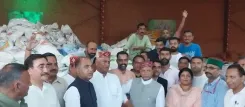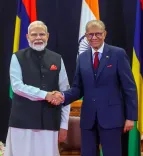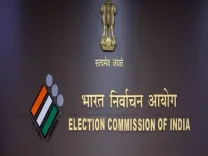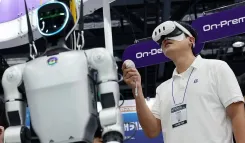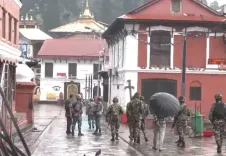FairPoint: Rahul's Speech Lacks Impact as PM Modi Captivates Audience
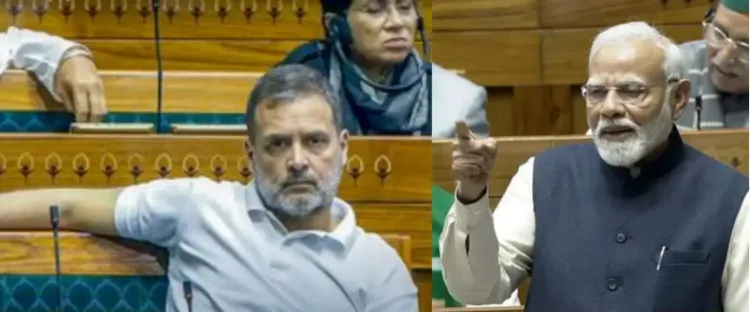
New Delhi, Dec 15 (NationPress) The Congress-led Opposition may have anticipated a successful challenge to the BJP-led Central administration concerning their favored issue of ‘Save the Constitution’ during the two-day debate in Lok Sabha, but the outcome was quite different as Prime Minister Narendra Modi emerged as the central figure in the end.
The two days of discussion resembled a classic exchange of blows, with both sides attempting to hit back with powerful rhetoric and sharp criticisms. The session traversed historical references, anecdotal evidence, poetic expressions, and both commendations and condemnations, showcasing a wide array of discourse.
While the Opposition endeavored to depict the government and BJP as anti-Constitution, the ruling party was just as combative, refuting accusations, debunking myths, and emphasizing factual information.
Leader of Opposition Rahul Gandhi’s approach involving a ‘pocket Constitution’ did not resonate well, as his address was found lacking in substance. His missteps were notable, with his ‘angry’ demeanor coming off as irritating. His comment that “tapasya” is meant to “generate heat in the body” elicited laughter from the MPs. Moreover, his reference to Eklavya, the archer from the Mahabharata, as a small boy and the claim that Dronacharya cut off his thumb were also met with ridicule.
In his address, the Congress leader criticized the BJP-led government by contrasting the Constitution with Manusmriti, invoking the works of V. D. Savarkar.
However, BJP MP Anurag Thakur, who spoke immediately after Rahul Gandhi, challenged his understanding of the pocket Constitution he frequently brandishes. Thakur, brandishing a copy of the document, questioned whether Gandhi had ever read it. “Those who wave the copy of the Constitution, don’t even know how many pages are there in the Indian constitution,” Thakur remarked, citing the foreword by senior Supreme Court advocate Gopal Shankar Narayan which stated that the Constitution was not influenced by Nehruvian thinking.
Thakur further addressed Rahul Gandhi’s jibe regarding Eklavya’s thumb, asserting, “Ye jo angootha kaatne ki baat karte hai inhone Sikhon ke gale katne ka kaam kiya tha” (It is during the Congress rule that the throats of Sikhs were cut).
Senior BJP leader Ravi Shankar Prasad recounted the atrocities of the Emergency, sharing his personal experiences. He also made a dig at Samajwadi Party chief Akhilesh Yadav, noting that his father, Mulayam Singh, also suffered. Prasad showcased a copy of the original Constitution, which featured images of Lord Ram, Lord Hanuman, Lord Nataraj, a scene from the Mahabharata, and Mughal emperor Akbar, but excluded Babar and Aurangzeb. He suggested that, hypothetically, if the Constitution were drafted today, the Opposition would protest against such illustrations.
Nearly all speakers from the Opposition were sharply critical of the BJP, accusing it of attempting to alter the Constitution. DMK leader A. Raja asserted that the ruling party would have modified the Constitution had the terms “secular” and “socialist” not been included in the Preamble during the Emergency. He also challenged the BJP to clarify the contributions of Rashtriya Swayamsevak Sangh (RSS) and the Hindu Mahasabha to the Constitution's formation.
Most Muslim MPs from the Opposition accused the government of bias and fostering an environment of fear, referencing incidents of mob lynching, recent violence in Sambhal, and disputes surrounding the Waqf Board.
During the initial day of the debate, Priyanka Gandhi Vadra made her debut speech, asserting that the BJP would have altered the Constitution if it weren't for the impending 2024 Lok Sabha elections. She emphasized that the “Constitution is a protective shield of justice, unity, and freedom of expression.”
The two-day discussion culminated in PM Modi's address, which presented “facts about the Nehru-Gandhi family” and detailed how they had consistently undermined the Constitution.
The PM conveyed that the amendments introduced by his administration were not aimed at consolidating power, unlike the Congress party. He claimed that the Nehru-Gandhi family had a “habit” of amending the Constitution to serve their interests, starting with the country’s first PM, Jawaharlal Nehru.
The 106-minute address was the highlight of the two-day event. Modi began by revealing lesser-known facts, such as the First Constitutional Amendment Bill of 1951 introduced by Nehru, which faced opposition and was related to the Right to Freedom of Expression, which faced criticism. He noted that Nehru’s daughter, Indira Gandhi, continued this trend with her amendments and the imposition of the Emergency during her tenure. He stated that the Congress amended the Constitution 75 times in six decades.
While Opposition leaders accused the BJP-led government of neglecting diversity, PM Modi emphasized Ambedkar’s vision of strengthening national unity. He asserted that his government was merely following Ambedkar’s dream, pointing out all the 'One Nation' initiatives implemented to bolster the country’s unity.
PM Modi concluded his speech in his characteristic manner, outlining 11 duties and pledges for citizens, including a commitment to zero tolerance for corruption and an end to dynastic politics, aiming for a Developed India by 2047.
(Deepika Bhan can be contacted at deepika.b@ians.in)

